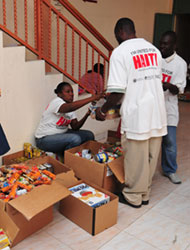- English
- Español
In Depth
Institutions and governments come together to cooperate for Haiti
 “Tragedy has returned to hit the already suffering Haitian people. It is in these moments when the people, the governments and the leaders of this hemisphere, as neighbors and brothers of the Haitian community, should show our sense of solidarity and support in a real, effective and immediate manner, guided by the government of the island, who knows best which are the most urgent needs,” stated the Secretary General of the Organization of American States (OAS) José Miguel Insulza this past January 12, after receiving information regarding the earthquake that hit the Caribbean nation leaving behind thousands of deaths, desolation and uncertainty.
“Tragedy has returned to hit the already suffering Haitian people. It is in these moments when the people, the governments and the leaders of this hemisphere, as neighbors and brothers of the Haitian community, should show our sense of solidarity and support in a real, effective and immediate manner, guided by the government of the island, who knows best which are the most urgent needs,” stated the Secretary General of the Organization of American States (OAS) José Miguel Insulza this past January 12, after receiving information regarding the earthquake that hit the Caribbean nation leaving behind thousands of deaths, desolation and uncertainty.
Amidst the astonishment and commotion created by the violent earthquake, the OAS reacted immediately, creating an Emergency Committee to face the tragedy and since then, it has worked together with the Pan American Development Foundation (PADF), the Pan American Health Organization (PAHO), the Inter-American Institute for Cooperation on Agriculture (IICA), the Inter-American Defense Board (IADB) and the Inter-American Development Bank (IDB) to coordinate efforts aimed at channeling help to the victims. Precisely, the first action was a donation of 100,000 dollars that the Organization gave to the Caribbean nation through the Inter-American Emergency Aid Fund (FONDEM).
The Pan American Development Foundation (PADF), an OAS affiliated entity, was in charge of channeling the support and by the date of this report it had already mobilized more than 50 tons of emergency supplies to Haiti. Among the long list of provisions sent were food, tents, impermeable canvases, water purification pills, bottled water and medicine, reaching a value of two million dollars. The total contribution is estimated to be about 10 million dollars, although according to Secretary General Insulza “the direct assistance and resources that the OAS will contribute will be well more than that, and will last during the time that they are needed. We know that the emergency will last for a long time.”
Along with donations made by countries, there are also contributions from OAS employees, the agencies of the inter-American system and the private sector. Donors such as Chevron, Bacardi, United Way Miami, Fed Ex, Ameriject, Aeropost, Argos, IMCA and the Association of American Chambers of Commerce, have all contributed with money and special services. Another entity, the Private Sector Forum of the Americas, launched a campaign at airports to collect cash donations. This initiative is currently in effect in the airports of Argentina, Ecuador, Uruguay and Peru.
On January 25, the Ministerial Preparation Conference on Haiti took place in Montreal, Canada, and was chaired by the Minister of Foreign Relations of that country, Lawrence Cannon. At the conference representatives of the United Nations (UN), the Organization of American States (OAS), the European Union (EU), the Inter-American Development Bank (IDB) and from numerous governments gathered to establish the humanitarian support bases and reconstruction of the Caribbean country.
Meeting participants agreed to create an entity or an international agency that would help with development assistance to Haiti, in accordance with the needs established and expressed by the Haitian government. This entity would be led by President René Préval with the support of other international-level representatives.
Referring to the conclusions of the meeting, OAS Secretary General reported substantial progress in coordination and joint efforts, which had been until now one of the principal challenges of cooperation and support offered to Haiti.
Later, in a report presented to the Permanent Council of the OAS after his visit to Haiti, the Secretary General stressed the need of improving coordination among international organizations, governments and non-governmental organizations, especially those involved in the distribution of aid. “We would like to provide all possible support, in the most organized and coordinated manner. The OAS keeps important projects for Haiti, mainly those related to children and work generation opportunities. Before the earthquake, we were working to raise the level of building and construction norms. Now we are sending help for the emergency situation,” said the Secretary General in an interview given to the newspaper “El Mercurio,” of Chile.
Although it has been estimated that the reconstruction of Haiti will take about ten years, the Secretary General said that “nobody can give an estimate of how long the rebuilding process will take, thus it is necessary to make a long-term commitment”. For that reason, it was agreed in Montreal that the reconstruction plan for Haiti will be discussed at a future meeting of all possible donor nations to take place at the United Nations headquarters in New York.
February, 2010


